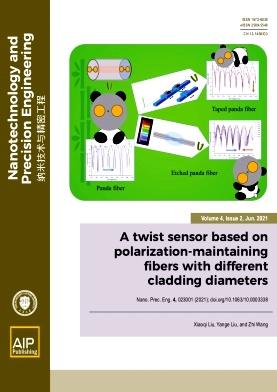A practical and effective method for reducing differential reflectance spectroscopy noise
IF 2.7
3区 工程技术
Q2 MATERIALS SCIENCE, MULTIDISCIPLINARY
Nami Jishu yu Jingmi Gongcheng/Nanotechnology and Precision Engineering
Pub Date : 2022-03-01
DOI:10.1063/10.0009680
引用次数: 1
Abstract
Differential reflectance spectroscopy (DRS) is a powerful tool to study processes during thin-film growth, especially that of transition metal dichalcogenides and organic thin films. To satisfy the requirements for in situ and real-time monitoring of film growth, including spectral resolution and sensitivity at the level of monolayers and even sub-monolayers, the most challenging technical task in DRS is to reduce noise to an extremely low level so that the best possible signal-to-noise ratio can be achieved. In this paper, we present a simplified and cost-effective DRS apparatus, with which we show that the measurement noise is mainly composed of thermal drift noise and explore the temperature-dependence of the DRS signal. Based on the results obtained, we propose an easily realized and effective scheme aiming to reduce the noise. Experimental results demonstrate that this scheme is effective in stabilizing reliable signals for a long period of several hours. Significant noise reduction is achieved, with the typical average noise of the DRS system being decreased to 0.5‰ over several hours. The improved DRS system is applied to study the growth of an organic semiconductor layer for an organic field-effect transistor device. The results indicate that the apparatus proposed in this paper has potential applications in fabrication of devices on the nanoscale and even the sub-nanoscale.一种实用有效的降低差分反射光谱噪声的方法
差分反射光谱(DRS)是研究薄膜生长过程的有力工具,尤其是过渡金属二硫族化合物和有机薄膜的生长过程。为了满足原位和实时监测薄膜生长的要求,包括单层甚至亚单层水平的光谱分辨率和灵敏度,DRS中最具挑战性的技术任务是将噪声降低到极低水平,以便实现尽可能好的信噪比。在本文中,我们提出了一种简化且具有成本效益的DRS装置,通过该装置,我们表明测量噪声主要由热漂移噪声组成,并探索了DRS信号的温度依赖性。基于所获得的结果,我们提出了一种易于实现且有效的降低噪声的方案。实验结果表明,该方案在长时间稳定可靠信号方面是有效的。实现了显著的降噪,DRS系统的典型平均噪声在几个小时内降低到0.5‰。将改进的DRS系统应用于研究用于有机场效应晶体管器件的有机半导体层的生长。结果表明,本文提出的装置在纳米级甚至亚纳米级器件的制造中具有潜在的应用前景。
本文章由计算机程序翻译,如有差异,请以英文原文为准。
求助全文
约1分钟内获得全文
求助全文
来源期刊

Nami Jishu yu Jingmi Gongcheng/Nanotechnology and Precision Engineering
Engineering-Industrial and Manufacturing Engineering
CiteScore
6.50
自引率
0.00%
发文量
1379
审稿时长
14 weeks
 求助内容:
求助内容: 应助结果提醒方式:
应助结果提醒方式:


